|
|
| Dum Pulef PilaelTae |
| Ped: Pulas PilaelTae |
|
50% |
[ 2 ] |
| Za: Kemb Pulas Za PilaelTae |
|
0% |
[ 0 ] |
| Tex |
|
25% |
[ 1 ] |
| Zae MoiKafRit: Dadikas enumbNeToi |
|
25% |
[ 1 ] |
|
| Total Votes : 4 |
|
|
|
|
|
|
|
|
 Posted: Mon Aug 03, 2009 1:00 pm Posted: Mon Aug 03, 2009 1:00 pm
Well, finally getting around to reposting this. Pilael is the language of the world NarVu,. Specifically, it’s the base tongue from which all languages/dialects are descended. Once I get Pilael fully fleshed out, I plan to work on making dialects using sound shifts. But I figure that’s a good way off yet, so let’s start with Pilael and its history. The Fictional History of Pilael Once upon a time, there was a world that was green and wonderful, and people lived there in several pre-urban societies with many languages. There was war, and peace, and happiness and sorrow and great biodiversity. And then a Super Volcano erupted and destroyed it all. What was left? Two or three remnants of civilization, minimal plant life and a big, ash-colored desert. The people who remained spoke Pilael, or learned it very quickly. All other languages were assimilated or went extinct. The Real History of Pilael In Seventh Grade I was one of the only people in my class who was considered “gifted” in math but not in English. Thus, when the gifted English class started working on a big project I could usually tell, because everyone would work on it during free time in math. The “Create-A-World” project was an accompaniment to Watership Down, which they were reading. Needless to say, I thought it was really cool and immediately went to the teacher and asked if I could do it too (She taught both classes). She said it was okay, and so I did. One requirement of the project was to create a language and make “30 important words of phrases to know when traveling in the world”. I made the unnamed NarVun language, which would eventually be known as Pilael. My "Current" Pilael is a serious overhaul of that language I made up for this Seventh Grade English Project: expanded, given a grammar and streamlined.
|
 |
 |
|
|
|
|
|
|
|
|
|
|
|
|
 Posted: Mon Aug 03, 2009 1:02 pm Posted: Mon Aug 03, 2009 1:02 pm
Alphabet and Sounds Now, I don’t know how this really will be received, since it doesn’t seem to be particularly popular in other conlangs, but I have three sets of letters (Sounds?) instead of just two. Initial Consonants come at the beginning of syllables and a represented in Romanization by capital letters. Final Consonants conclude syllables and are represented by lower case letters. Initial and Final consonants often come pairs of the same or similar sound, but not always. The third group is Vowels, obviously. There is a vowel in every syllable, and only one. It can begin or end a syllable, but it not a syllable by itself. Also, two vowels cannot be put together in the same word, so there are no “Dipthongs” per se. There are 7 vowel sounds and they cannot be combined. 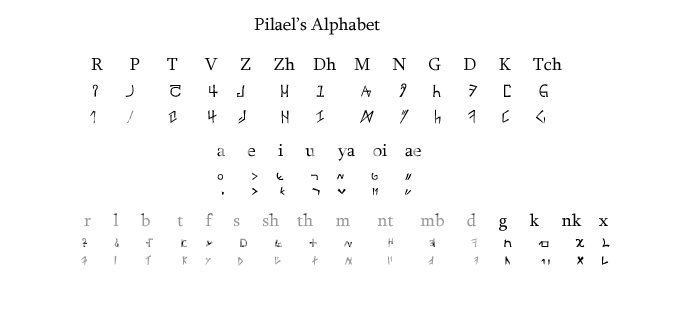 Initial Consonants Initial Consonants- Pronunciation R as in “Rat” P as in “Pear” T is in “Tear” V as in “Vat” Z as in “Zoo” Zh as in the Z in “aZure” Dh as in the TH in “THat” M as in “Mouse” N as in “Napkin” G as in “Gape” D as in “Dog” K as in “Kite” Tch as in the end sound in “maTCH” Vowels- Pronunciation a as in “father” e as in “fen” i as in “pin” u as in “dune” ya as in “yarn” oi as in the oy in “toy” (Note: If by mistake “yo” ever appears then this is what is meant.) ae as in the y in “sky”
Final Consonant- Pronunciation r as in “pear” l as in “ball” b as in “jab” t as in “cat” f as in “stuff” s as in “pass” sh as in “fish” th as in “path” m as in “damn” (It is half way between an m/n) nt as in “plant” mb as in “combust” (with just a hint of the b at the end) d as in “dad” g as in “bag” k as in “shake” nk as in “plank” x as in “fox”
StressThis is kind of complicated…. Stress is unpredictable, but it tends to be on the last syllable in the basic form of the word. So it’s Pil-AEL, or when as a subject Pil-AEL-Za. Or with a verb it’s er-MAD or er-MAD-as. But with People’s names, the stress tends to be on the first syllable, so KaKaer is KA-Kaer and KA-Kaer-Za.
|
 |
 |
|
|
|
|
|
|
|
|
|
|
|
|
|
|
|
 Posted: Mon Aug 03, 2009 1:04 pm Posted: Mon Aug 03, 2009 1:04 pm
Dictionary able, to be –efeth (Irregular) above - Peraer act, to - KuGa against - afTer all -Va alone - PatZu ancient - VerZi appear, to - Pael at(place) - Tux at(time) - Gis baby - DuRa back - Puf bare - anktChu battle - Zekoi be, to – emb (irregular) before - aexid beginning - Kak big - egTa black - ankKu blood - Tchax boy - Ze bread - Kuf break, to - Kash bride/groom - KyaNa(r) burned - ankKi bury, to - PefKa but - Ku by - VuZa by means of - NuVe cage - ettChoi certain - Malith cheese - Oif come, to - Zumb crown - Dubek crumple, to - ZhuxTar cry - KuRa cry, to - Paem current - en dark - Zhuk daughter - ZhuPar dawn - yafDoir dead (Physical) - enkKu dead (Spiritual) - Zheke dear - atTe desire, to - ifyad destruction - RuDha door - Kad dream - aekZar drink, to - Mint drop, to - GeRa dry - Zas dry, to - Zat earth - Vent east - KiRe empty - Voir end - KaMesh enemy - Dhoik evil - enumb face - Perith fall, to - Zarunk fear, to - GaRu feel, to - aset field - Tefal fill, to - Duroi fish - Pishit flock - Tchag flow, to - TaxMa fly, to - ekKoi follow, to - PalTu food - Gint for - Dink Forbidden - TaZha forget, to - TetRu frog - PeTi from - DeNu game - VeshDi gift - Gabar girl - Zer give, to - Gamb go - unkad good - ulat grass - al green - Vyath hand - ZaekRoi hate, to - Zhetorix have, to - idVunt he/she - KerTunk head - ReKin hear, to - Dhyat heart - adDhu here - (See This) hidden - ekRa hide, to - ekRi high - ikNae hill - TuKa hold, to - ZhaeNoi hollow - ZiPoith hollow, to - VoirZix I - TePas If - tChya In - yashis Inheritance - Nyabik Ink - Gu invariable(Always) - VaTo it - Kankish ivory - GuDa jar - Rekin kill, to - enkZe King - KaDoi Land - Peth letter (Character) - edDePal life - Vyax light - VaZhur live, to - Vyar long - Duk look, to - Mat love (Familial) - Melan love (Romantic) - Nelis love (Tragic) - Relyar love, to - Nel magic - NoiZhe make, to - uboinNe many - NarZhank memory - ZhubarRu mercy - VexGu midnight - umbesh mind - yambPe mist - Daf mountain - ash name - Kasif name, to - Vael nameless - KasifZa north - ZuVunt now - enNe old - PePa on - TeNu on top of - Dyak or - um out - Mu over - Zhae pain - tChek paint - Kafeg paint, to - KafRi paper - inZhu perfect - KethKa plan - ibZhae plan, to - ibZha play, to - DuKe possession - KaVit preserve, to - Dhaesh put, to - MiKas quick - aesh quiet - umbus rain - NyaMi reach, to - GefVoir read, to - Kyar recognize, to - ad red - elKa reflection - PeVint relic - Kyax remember, to - ZhuRa ride, to - urMem rider - MoirMem river - PeZha road - efVex rule, to - KaVoi sack - ishPa sacred - Zhekel safe - Ni safety - ekerRa scrape, to - inkRin sea - ZheGa security - TaNed see, to - DiNed seek, to - KaDhi seldom - Tankaf shadow - eshKi shelf - KaTir shine, to - Nish show, to - ValudDa side - Mub silence - umbRa silver - ixTchu sing, to - Tes sit, to - Tchar skin - Pef sky - DhaTu slave - DuKa(r) sleep, to - axVa slow - Pyag small - ef snow - itPae son - ZhuPa song - Tel sound - Des south - egPi spill, to - Kyak spring - Vyad star - Raenith start, to - Kak steal, to - KuZu sticky - aeDhya stone - asZux stony - asZu stop, to - VerZhan storm - Dhedak strange - efVish surrender, to - Kaxut tainted - GurZan take, to - GarRet talk, to - Pul taste, to - VuZhin tasty - VuZhed text (writing) - erVoi that - Vik there - (See That) they - KeGil they (Inanimate) - KunkKin think, to - RaTchu this - Tu thought - VembPoif throne - VeRix through - uf thunder - DherZu to - ix tower - ZePent tree - VyaTin true - etTi try, to - MeRin turn about, to - GisMoi under - Zet understand, to – Pil understanding – Pilael up - Tche use, to - Zhirent valuable - DyaNe value - Dyanes vein - Vaen very - Zhent violent - ZeKent water - Pesh we - edant we all - KoiDant weapon - ufGar wear, to - VoiDi west - Kith wet - Pish window - (TL) VinDu winter - Kil with - Zhi world - Valen worship, to - etRa write, to - erMad you - PuKoib
|
 |
 |
|
|
|
|
|
|
|
|
|
|
|
|
 Posted: Mon Aug 03, 2009 1:05 pm Posted: Mon Aug 03, 2009 1:05 pm
Fundamental Grammar (I apologize if this is a bit jumbled)
Basic Overview
Pilael is VSO in basic word order. It is also ergative, so for intransitive verbs the order is just VO. However, word order can be changed to reflect shades of meaning. Nouns Nouns are declined to reflect whether they are Nominative, Accusative or “Relative” (which is Genitive + Dative + Ablative) and whether they are Singular or Plural. There are three declinations: The Object Declination, the Name Declination and the Time/Place/Abstract declination. Each Declination has a variation for words ending in vowels and consonants. (For the Name declination the line can roughly be drawn masculine/feminine, with masculine names tending to end in vowels) 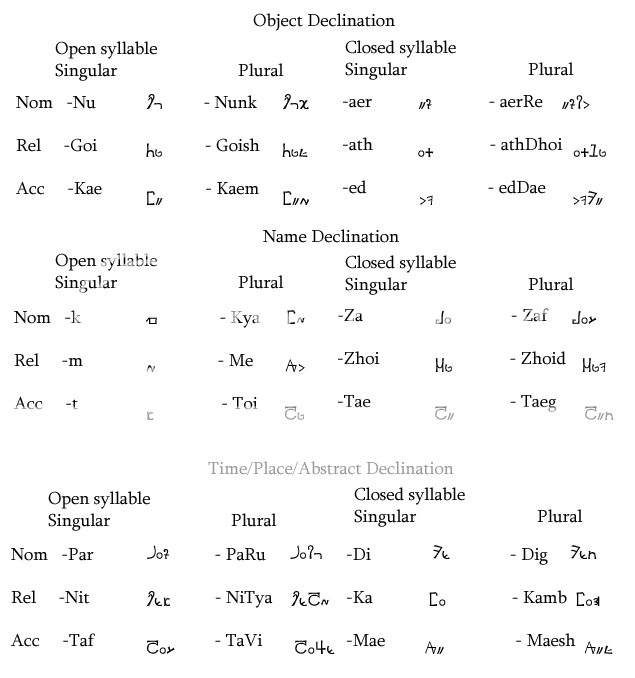 Which declination is used with a noun is not fixed, and changing which way you are declining a noun is a way to convey meaning. Any word can become a name, if used with the name declination. Any word can become a place or an age, if used with the abstract declination. So, for instance, PePaNu is a stone, PePak is a man’s name and PePaPar is the place of the stone. The other side of this is that when referring to a person, you can objectify them by using the wrong declination, a serious insult. Verbs Verbs are conjugated with both prefixes and suffixes. Prefixes indicate tense of the verb while Suffixes indicate who is doing the action. There are six different verb tenses: the present, the perfect, the future, the imperfect, the past perfect and the future perfect. Each one has a set of prefixes, one for words that begin with consonants, the other for ones that begin with vowels. 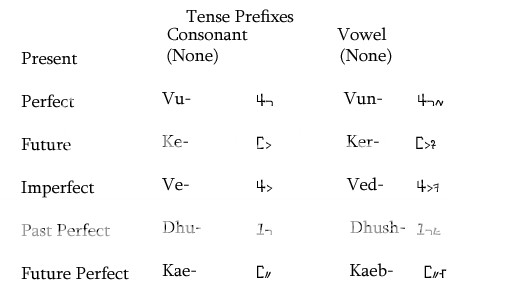 As in most romantic languages, Pilael divides up who is doing the action into three “persons” with a singular and plural of each. However, the exact division is not the same, as we will get to in the Pronouns section. Pilael has two conjugations. Each conjugation has two sets of endings, one for active and one for passive voice. Although it’s considerably less reliable than with nouns, generally verbs that end in consonants are first conjugation and verbs that end in Vowels are second conjugation. 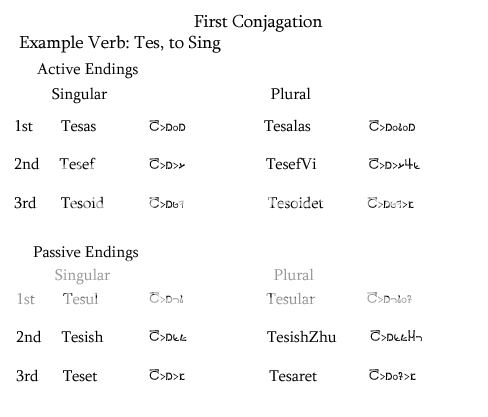 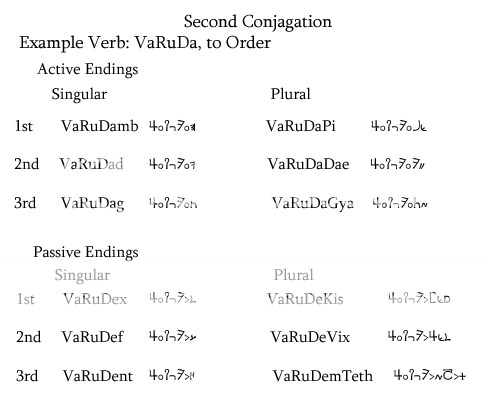 Like in most languages, in Pilael the verb “to be” is irregular: “emb” is the infinitive, and then it has six endings each for being present, perfect, future and imperfect. (Forgive the graphic, it’s old, all "yo's" are now "oi's") 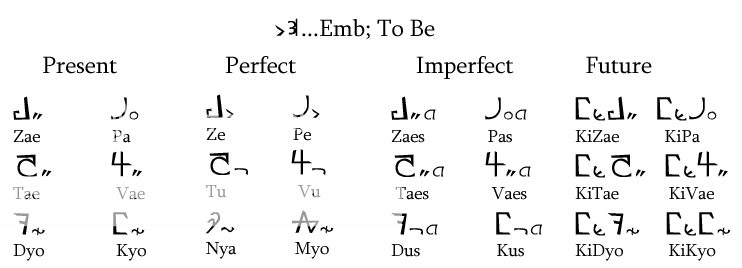 Verbs can also be used in the Imperative voice for commands. This is simply accomplished by adding “-tChe” on the end of the infinitive for singular commands and “-attChe” for plural ones. (Keep in mind that this is second person singular and plural, so the divisions are funny as we will talk about now.) Pronouns
One of the major differences in cultural thought between the NarVuns and us is that they differentiate between groups of people differently. While some things are the same, others are very different. The First person Singular “TePas” is still “I”, but the direct correlation pretty much ends there. There are two sets of Third person pronouns, one for people and the other for animals and objects. The “animate” Pronouns, “KerTunk” for singular and “KeGil” for plural, are not distinguished by gender. The “Inanimate” Pronouns “Kankish” and “KunkKin” similarly do not distinguish between objects and animals. Okay, now to cover the major difference in who it’s talking about. The Second person singular “PuKoib” includes both you and Ya’ll, simply making a singular group out of the people being addressed. On the other side of things, the First person Plural “edant” means “we” with only the group of the speaker, at the exclusion of the person being spoken to. This leaves the Second person Plural “KoiDant” to be “we all” and refer to both the speaker and spoken to. Notice that each of the pronouns is two syllables. In casual settings, the first syllable can be omitted to give you an abbreviated pronoun. These are “Pas” “ant” “Koib” “Dant” “Tunk” “Gil” “ish” and “Kin.” Abbreviated pronouns are only used in two scenarios: informal or rushed talking and poetry. Often one version of a pronoun or another will be used to help fit with meter. Modifiers
Modifiers come after the words they modify, including adjectives, adverbs and prepositional phrases. Adjectives modify nouns, but are not declined. Adjectives all have equivalent Adverb forms to modify verbs. These are made by adding the suffix –Ne onto the end of the adjective. So "long" is Duk, but "far" is DukNe. Prepositional phrases begin with a preposition which are then followed a noun in the relative case (and perhaps an adjective if the noun is modified). Prepositional phrases can modify any noun or verb in a sentence. Indirect objects are considered adverbial prepositional phrases. When a noun or verb is modified by both an adjective/adverb and a prepositional phrase, then the adjective/adverbs always go first. When one prepositional phrase is modifying another phrase rather than the base word, (e.g. the man in the green hat with the feather rather than the man in the green hat with fuzzy eyebrows) the set of conjoined phrases is arranged with the one describing the base first and then all modifying phrases afterwards. Punctuation In Pilael, all sentences are considered to be in a “neutral” voice unless a punctuation-like modifier is added to the very beginning of the phrase. There are seven different types of punctuation: Three tone modifiers and four different types of question marks.
ToneThe first of the tone modifiers is the figurative particle, ‘Noi’. The use of “Noi” at the beginning of a sentence indicates that the sentence contains figurative language, or is meant ironically. The second is the exclamatory particle, “Vi”. Adding “Vi” onto the beginning of a sentence is similar to adding an exclamation point at the end, but it tends to indicate anger more than joy and can be used to assert dominance over the person being spoken to. It’s kind of rude. The third and final of the tone modifiers is the submissive particle, “Pe”. Almost the exact opposite of “Vi”, “Pe” shows a willingness to be commanded and it a sign of respect. When talking to superiors in a formal setting, it’s important to use Pe often. QuestionsIn Pilael, questions are formed by taking a sentence and adding the appropriate interrogative particle to the beginning. There are four types of questions and a different particle for each. Quantitative questions ask ‘who,’ ‘what,’ ‘where,’ or ‘when’. They are formed with the particle “Tex.” Which exactly it is can be determined by context. Qualitative ask ‘why,’ or ‘how’. “Dhab” is the particle for qualitative questions. “Maek” and “Dum” are both for types of yes and no questions. When “Maek” is used at the beginning of a question, it is a yes/no question asking permission of an authority about something. “Dum,” on the other hand, is simply asking about matters of reality. When talking to a figure of great authority, you might substitute “Maek” for “Dum” in special circumstances.
|
 |
 |
|
|
|
|
|
|
|
|
|
|
|
|
|
|
|
 Posted: Mon Aug 03, 2009 1:08 pm Posted: Mon Aug 03, 2009 1:08 pm
More Complex Grammar
Negation Negation is marked by two parts, working a bit like parentheses: Kemb goes before whatever's being negated and Za goes after. However, if it’s obvious what’s being Negated, then you can simply put in the word “KembZa” anywhere in the sentence. The Relative Clause Like with negation, the Relative clause (eg: The man- who wore a hat- went to the grave yard) is represented by two markers, one that goes before and one that goes after. The first marker is either “Nuk” (Object) “Zak” (Name) or “Pak” (Place) and agrees with the noun being modified. However, then end of the relative clause is always marked with “yas”.
Purpose and Result Clauses
Clauses that Mark the purpose of an action are put into their own phrase after the main sentence (Separated by a comma) and begun with “ux” (The purpose particle). Clauses that mark the result of an action are also segregated from the rest of the sentence, but are instead begun with “er” (The result particle). Prerequisite Clause Marked by “If” in English, the pre requisite clause is put in a separate phrase before the sentence and begins with the particle “Tchya” The Subordinate Clause
Generic Complementizer Roughly the equivalent of "that" in English, the particle "eb" introduces a subordinate phrase attached to a verb such as "I know that he's lying" Also used in introductions of sentences giving the time or place of occurrence, eg "Long ago," or "Once upon a time..." Group Naming In order to indicate different groups or relations, Pilael uses a set of prefixes which indicate your relation to a noun, name or verb. There are five:
The Family Prefix: Ni- Generally means “of this family group” although often it stretches to cover the group of people you travel with, whether or not you are all extended family. In titles, it designates the name of your home caravan. The Tribe Prefix: Dha- This one refers to a tribal allegiance, which is kind of a combination of your country and ethnic group. It is only ever used when dealing with outsiders. The Occupation Prefix: Moi- This is added onto a verb and is used to indicate that you do this action for a living, or are skilled in it. (This is specifically for skilled labor and not for your run of the mill occupation) A person who steals once or twice is not a thief, but a person who gets by by stealing is. The Disciple Prefix: Gae- This is the designation of some one who lives in the style of a certain person or god. A priest, or a member of an order of some kind almost always identifies themselves using this. The Doctrine Prefix: Gi- This is added to a noun to indicate a metaphysical philosophy based on some principle of nature. It’s basically the non animate form for the Disciple Prefix. Anything I’m forgetting? Don’t be shy, ask! I probably haven’t thought about it yet and I need reminding!
|
 |
 |
|
|
|
|
|
|
|
|
|
|
|
|
 Posted: Mon Aug 03, 2009 1:11 pm Posted: Mon Aug 03, 2009 1:11 pm
Numbers First thing's first: My culture's numbering system is base twelve, which means you switch over to the next "place" every twelve numbers instead of every ten. (They count with ten fingers and two opposable ears.) Okay, so you start out with the single digits which go: Number – Cardinal (Ordinal) 1 - Zhu (Zhus) 2 - Doi (Doif) 3 - Ki (Kit) 4 - Pevi (PeVim) 5 - Ga (Gax) 6 - Zae (Zaent) 7 - Tu (Tumb) 8 - NaTchi (NaTchik) 9 - Dhe (Dher) 10- Pya (Pyank) 11- atZu (atZug) Now, the Twelve's place is made by a combination of the Ordinal (First, Second, Third) version of the number and etTchi, which is twelve. (Notice that 4 and 8 are irregular, I think this may be because they're commonly used numbers.) 12 - etTchi 24 - DoiVetTchi 36 - KiTetTchi 48 - PeMetTchi 60 - GakZetTchi 72 - ZaenTetTchi 84 - TumPetTchi 96 - TchiKetTchi 108 - DheRetTchi 120- PyanKetTchi 132- atZuGetTchi Then, you move onto the 144 root word, amMa with a similar pattern. 144- amMa 288- DoiVamMa 432- KiTamMa etc. I also have a similar word for 1728 (yashZhe) but I really haven't needed to use that yet. To put together numbers, you add the lower places as syllables on the end of the word. Ex: etTchi +Zhu = etTchiZhu Four, eight and eleven are special, the first two for only using one syllable, the third for eliding (merging) with the previous word. etTchi + PeVi = etTchiPe etTchi + NaTchi = etTchiTchi etTchi + atZu = etTchyatZu Anyways, time for some fun. Find Your Age in Narvun (You will need a calculator). 1. Find your age in days - Take your age in years - Multiply by 365, add 1 for every 4 years - Add the number of months since your birthday times 30 2. Divide this number by 253. Round down 3. Look up. For example: I'm DoiVetTchi. Being 17 (earth years), I'm 24 (Narvun Seasons). And if you're below etTchiTu you're not supposed to be posting here. (Although Narvuns consider people adults at etTchiTchi)
Written Numbers
There are two styles for writing numbers. Unfortunately, I don’t have a good way to show them off just yet: (((Under Construction)))
|
 |
 |
|
|
|
|
|
|
|
|
|
|
|
|
|
|
|
 Posted: Mon Aug 03, 2009 1:12 pm Posted: Mon Aug 03, 2009 1:12 pm
Translations and Compositions: Nursery Rhymes Original: If all the world were paper, And all the sea were ink, If all the trees Were bread and cheese, What should we have to drink? Pilael: tChya Nya ValenDi Va inZhuKae tChya Moi ZheGaPar Va GuKae tChya Moi VyaTinaerRe Va Kufed oifed Toi er Tex KeMintefVi Original: Come to the window, My baby, with me, And look at the stars That shine on the sea! There are two little stars That play bo-peep With two little fish Far down in the deep; And two little frogs Cry "Neap, neap, neap;" I see a dear baby That should be asleep. Pilael: DuRa PasZhoi: ZumbtChe ix VinDuNit Zhi PasZhoi: MattChe ix RaenithZhoid Zak Nish TeNu ZheGaNit yas Toi: DuKeGya Zhi PishitathDhoi ef Doi yashis ZheGaNit RaenithZaf ef Doi VeshDiTaVi: Puloidet PeTiNunk ef Doi Toi “PeTi, PeTi, PeTi,” DiNedas Durat ulat Zak Vi emb axVa yas Song Translation Reflection, from Disney's Mulan (Should really record this one...) Matche, Pas: Kemb Kizae Za KyaNarTae KethKa Um ZhuParTae KethKa: Dum KembZa Efeth KuGa PefMae Tu? Matas enNe: tChya Ze etTiNe PasZa PasTae Zhus er KaeKashas adDhut Tu: Tex Dinedas ZerTae Zak Mat Tux PasZhoi yas? Dhab KembZa PeVintTae adas TePasZhoi? Kemb efeth ekRi Za TePasTae: VeMeRimb: Tex KeValudas PeVintZa PasTae etTi Zhus? Tex KeValudas PeVintZa PasTae etTi Zhus? The Raven King(Original Version)Kadoi RaVenath Noi VuGefVoiras Mu ZaekRoiKae PasZhoi: Vun GisMoiGya PeZhaPaRu PethKa AnGoiKa: Vun TaxMa Tche Noi VuGefVoiras Mu ZaekRoiKae PasZhoi: Vun VerZhunoidet yashis VaenathDhoi GilathDhoi TchaxedDae DhoikathDhoi PasZhoi Noi VuGefVoiras Mu ZaekRoiKae PasZhoi: VunekKumTeth DeNu RekinathDhoi DhoikathDhoi PasZhoi VembPoifDi ZhubarRuParToi: Noi Moi Tchaged esTarRinathDhoi ZhuxTaret DhoikaerRe PasZhoi: Noi Moi ishPaKaem Voi Vi VuZumbas NuVe DafKamb NyaMiNiTyaToi ix KeGilMe Vi VuZumbas NuVe aekZaKamb umbeshKa ix KeGilMe Vi VuZumbas ix KeGilMe: Ze Tchaged RaVenathDhoi er Deroi Gis yafDoirKa DhatuKae ZuVuntKa Noi VunRaTchuGya Gis DhethKa KeGilKya Vun idVuDemTath ekerRaPar: Vi VuZumbus ix KeGilMe: Ze KuraKae er GarRet umbRaTaf Mu VyuTinZhoid KilKa VuboinNoid ux PasZhoi NyaMik Kaded: Vunkadas uf KishGoi PasZa VuboinNoid ux PasZhoi asZuxKya VeRixMae: VuTchas dyak KishGoi PasZa VuGambaret ix TePasZhoi KaDoiTaVi Ki ux emb VaTuNe PasZhoi VuGambet ix PasZhoi AnGoiTaf ux emb VaTuNe PasZhoi Vun VoiDiDag DuKaNu KasifZa Dubek ixTchuDa Nya ix PethKa efVish DuKaNu KasifZa Kadoit Noi etRaDent ix NarVuNit ufGaredDae Nuk VuZhiredet afTer PasZhoi DhoikToi PasZhoi yas: Noi Koi Kinaer KyaxedDae ZheKel Dhaesharet ibZhaeTaVi Pak VuboinNoidet afTer PasZhoi DhoikToi PasZhoi yas: Moi erVoiTavi ZheKel inkRent DeNu VentKa GurZan NuVe GaeNarVuMe Tchaxed Nuk VuKyakas TeNu TefalKamb ZeKoiNiTya VerZi yas: VuMikaset yashis Rekinath ixTchuGoi GudaGoi Toi VuGambas ix DhanGoiNit NoiZheTaf: Nya NyabikMae DyaNe Ku Vin ZhetorixGya DhanGoiKya GabarTaf TePasZhoi Vi Ker erMadent NuVe NyaMim TeNu DhatuNit NyabikMae: Vi Ku Kemb Kefedet Za KeKyar KeGilTaeg KishTae Vi Ker erMadent TeNu PerithDhoi TuKaMe asZu NyabikMae: Vi Ku Kemb Kefedet Za Ker ZhaeNoi yambPeKya GilZhoid KishTae Vi Kikoi yashis KilKa VyaTinaerRe anktChu edDePaladDae ankKu: Vi Ku Kemb Ker ZiKyaGya Za KishTae Vi KePaeloidet yashis PethKa AnGoiKa MoiNyabikZaf Doi Vi Ker GaRuGya TunkZa Zhus PasTae: Vi Ker ifyadGya DiNed TunkZa Doif PasTae Vi Ker Kavoint NuVe MoiKuzuMe MoinkZeMe Toi TunkTae Zhus: Vi Ker ibZhag TunkZa Doif RuDhaTaf TunkZhoi Vi Ker PefKag yashis VyaTinathDhoi Zhuk Zet itPaeGoi TunkZa Zhus adDhuKae TunkZhoi: Vi Ku Ker asetag DukNe tCheked KishZhoi: Vi KeDiNedoid yashis ZaekRoiGoi Dhoikath TunkZa Doif KaVitTae ate TunkZhoi Vi KeVyaroid PatZu TunkZa Zhus Vyax TunkZhoi: Vi Kidoi MoittChoik TunkZhoi Vi Ker PalTug TunkZa Doif efVexMaesh PatZuNe ux KaDhi ZePentMae Zhuk TeNu TuKaNit ikNae MubKa: KiDoi Paer ReKin TunkZhoi DheDakDi tCharoid yashis eshKiNiTya Dyak VeRixath ankKu TePasZa: Vi Ku Kemb efedet Za KeDiNed KeGilZaf PasTae Vi KeboinNoid ux PasZhoi NyaMik Kaded: Vi Kenkadas uf KishGoi PasZa Vi KeboinNoid ux PasZhoi asZuxKya VeRixMae: Vi KeTchas dyak KishGoi PasZa Vi Ker VoiDiDag DuKaNu KasifZa Dubek ixTchuDa Vi KiDoi ix PethKa efVish DuKaNu KasifZa Kadoit…
|
 |
 |
|
|
|
|
|
|
|
|
|
|
|
|
 Posted: Mon Aug 03, 2009 3:33 pm Posted: Mon Aug 03, 2009 3:33 pm
I like what I see so far. I'll have to look at it more closely.
|
 |
 |
|
|
|
|
|
|
|
|
|
|
|
|
|
|
|
 Posted: Mon Aug 03, 2009 7:24 pm Posted: Mon Aug 03, 2009 7:24 pm
Tweezle I like what I see so far. I'll have to look at it more closely. Thanks much, and I hope you do look more closely. mrgreen Also, edited in the translations and reformatted.
|
 |
 |
|
|
|
|
|
|
|
|
|
|
|
|
 Posted: Thu Aug 06, 2009 4:36 pm Posted: Thu Aug 06, 2009 4:36 pm
I love this. and really don't know what else I can say o.o... it just flows so naturally and beautifully, even with basic words! the script is just... oh so amazing! This honestly feels as though it could be an actual language!
|
 |
 |
|
|
|
|
|
|
|
|
|
|
|
|
|
|
|
 Posted: Thu Aug 06, 2009 6:16 pm Posted: Thu Aug 06, 2009 6:16 pm
Shangroulu I love this. and really don't know what else I can say o.o... it just flows so naturally and beautifully, even with basic words! the script is just... oh so amazing! This honestly feels as though it could be an actual language! Well that's excellent as it's supposed to be a gateway into an entire culture. mrgreen I'm glad I got something good my first time, since this is has taken quite a bit of work. I must admit though, despite spending all my time making up vocab, I'm still considerably less than 500 words. And they're not even the ones I will probably need. Maybe I should start translation dialogues...
|
 |
 |
|
|
|
|
|
|
|
|
|
|
|
|
 Posted: Thu Aug 06, 2009 7:31 pm Posted: Thu Aug 06, 2009 7:31 pm
Tesar Eshne Shangroulu I love this. and really don't know what else I can say o.o... it just flows so naturally and beautifully, even with basic words! the script is just... oh so amazing! This honestly feels as though it could be an actual language! Well that's excellent as it's supposed to be a gateway into an entire culture. mrgreen I'm glad I got something good my first time, since this is has taken quite a bit of work. I must admit though, despite spending all my time making up vocab, I'm still considerably less than 500 words. And they're not even the ones I will probably need. Maybe I should start translation dialogues... That's usually where I start. the best is probably making phrases that a person uses everyday. I have a Ton of Lonely Planet Phrase books, and I usually use those as material for my own translations
|
 |
 |
|
|
|
|
|
|
|
|
|
|
|
|
|
|
|
 Posted: Thu Aug 06, 2009 7:46 pm Posted: Thu Aug 06, 2009 7:46 pm
Shangroulu Tesar Eshne Shangroulu I love this. and really don't know what else I can say o.o... it just flows so naturally and beautifully, even with basic words! the script is just... oh so amazing! This honestly feels as though it could be an actual language! Well that's excellent as it's supposed to be a gateway into an entire culture. mrgreen I'm glad I got something good my first time, since this is has taken quite a bit of work. I must admit though, despite spending all my time making up vocab, I'm still considerably less than 500 words. And they're not even the ones I will probably need. Maybe I should start translation dialogues... That's usually where I start. the best is probably making phrases that a person uses everyday. I have a Ton of Lonely Planet Phrase books, and I usually use those as material for my own translations Hm... I don't think I could deal with just doing phrase book-style things. (I kind get bored easily when just finding stuff to translate.) I mean, I will need stuff like from phrase books, but... I don't know, maybe I'll make a story out of it or something. To keep me occupied. A Vignette, maybe.
|
 |
 |
|
|
|
|
|
|
|
|
|
|
|
|
 Posted: Thu Aug 06, 2009 7:50 pm Posted: Thu Aug 06, 2009 7:50 pm
Tesar Eshne Shangroulu Tesar Eshne Shangroulu I love this. and really don't know what else I can say o.o... it just flows so naturally and beautifully, even with basic words! the script is just... oh so amazing! This honestly feels as though it could be an actual language! Well that's excellent as it's supposed to be a gateway into an entire culture. mrgreen I'm glad I got something good my first time, since this is has taken quite a bit of work. I must admit though, despite spending all my time making up vocab, I'm still considerably less than 500 words. And they're not even the ones I will probably need. Maybe I should start translation dialogues... That's usually where I start. the best is probably making phrases that a person uses everyday. I have a Ton of Lonely Planet Phrase books, and I usually use those as material for my own translations Hm... I don't think I could deal with just doing phrase book-style things. (I kind get bored easily when just finding stuff to translate.) I mean, I will need stuff like from phrase books, but... I don't know, maybe I'll make a story out of it or something. To keep me occupied. A Vignette, maybe. I am unsure of what that is... but I know what you mean lol, I have these books that are a collection of the years best Science Fiction, and I LOVE translating those lol, they are short stories so usually around twenty pages to fifty so easy stuff to translate. So short stories might be a good place to start? simple and to the point? plus it isn't too murderous if you are using a script to write out another version, I done that and trust me, a simple script always proves worthy in such a situation lol
|
 |
 |
|
|
|
|
|
|
|
|
|
|
|
|
|
|
|
 Posted: Thu Aug 06, 2009 8:01 pm Posted: Thu Aug 06, 2009 8:01 pm
Shangroulu Tesar Eshne Shangroulu Tesar Eshne Shangroulu I love this. and really don't know what else I can say o.o... it just flows so naturally and beautifully, even with basic words! the script is just... oh so amazing! This honestly feels as though it could be an actual language! Well that's excellent as it's supposed to be a gateway into an entire culture. mrgreen I'm glad I got something good my first time, since this is has taken quite a bit of work. I must admit though, despite spending all my time making up vocab, I'm still considerably less than 500 words. And they're not even the ones I will probably need. Maybe I should start translation dialogues... That's usually where I start. the best is probably making phrases that a person uses everyday. I have a Ton of Lonely Planet Phrase books, and I usually use those as material for my own translations Hm... I don't think I could deal with just doing phrase book-style things. (I kind get bored easily when just finding stuff to translate.) I mean, I will need stuff like from phrase books, but... I don't know, maybe I'll make a story out of it or something. To keep me occupied. A Vignette, maybe. I am unsure of what that is... but I know what you mean lol, I have these books that are a collection of the years best Science Fiction, and I LOVE translating those lol, they are short stories so usually around twenty pages to fifty so easy stuff to translate. So short stories might be a good place to start? simple and to the point? plus it isn't too murderous if you are using a script to write out another version, I done that and trust me, a simple script always proves worthy in such a situation lol A Vignette is a short mood piece of fiction, even shorter than most short stories. So, yeah, that was the idea. I was actually going to pick a few in-world characters and write little stories about them, so it's both creative and fun and a character/language building exercise. 3nodding
|
 |
 |
|
|
|
|
|
|
|
|
 |
|
|
|
|
|
|







